Boris Savinkov’s life provides rich material for a biographer. A revolutionary terrorist in late imperial Russia, Savinkov was responsible for several spectacular assassinations, including the Governor General of Moscow, Grand Duke Sergei. When not organizing plots, Savinkov published fiction under the pen name V. Ropshin, including the novel Pale Horse, which is about a revolutionary terrorist who assassinates a Grand Duke.
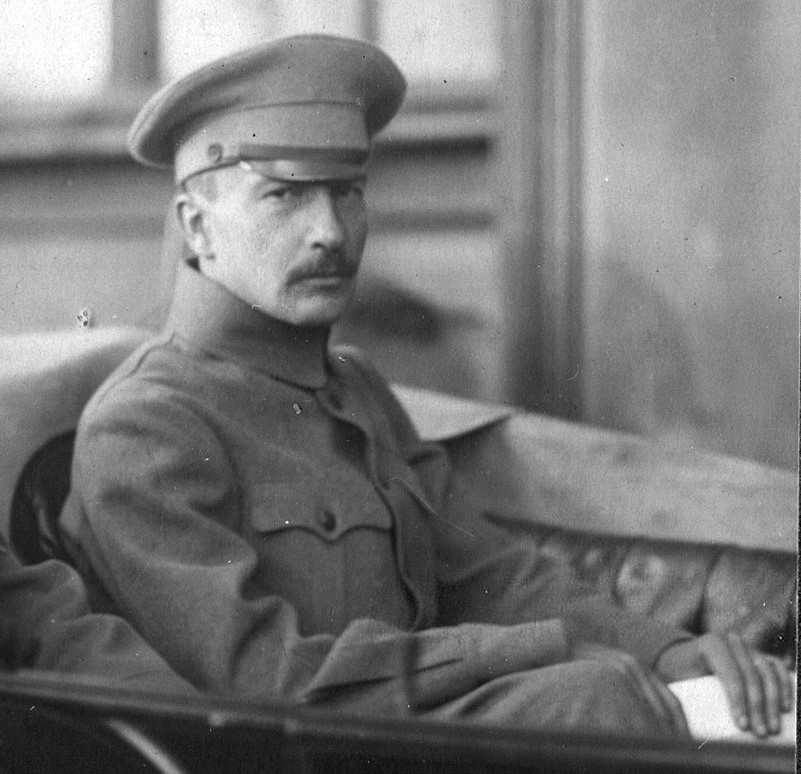
Boris Savinkov as the Deputy Defense Minister of the Russian Provisional Government, 1917.
When revolution swept across Russia in 1917, Savinkov returned home and ultimately became Deputy War Minister in the Provisional Government led by Alexander Kerensky. He would fight against the Bolshevik dictatorship, teaming up with western allies and anti-Bolshevik forces in a series of schemes.
Soviet secret agents lured him back in 1924, where he was arrested and convicted in a public show trial. The next year, Savinkov threw himself from a prison window (many have suspected he was thrown). In this remarkable twenty-year time span, Savinkov’s friends, collaborators, and acquaintances included a who’s who of political leaders, writers, and spies from the early 20th century.
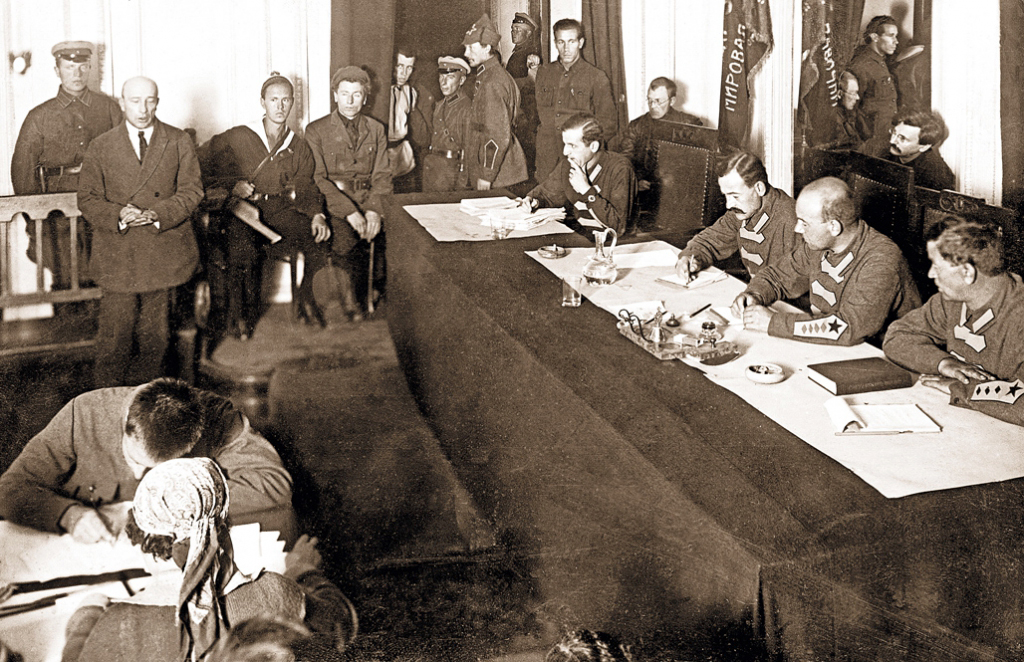
Boris Savinkov on trial in the Soviet Union, 1924.
Vladimir Alexandrov, Emeritus Professor of Slavic Languages and Literatures at Yale University and author of the excellent 2014 biography The Black Russian, has taken up Savinkov’s story. To Break Russia’s Chains, Alexandrov writes, is “the story of a remarkable man who became a terrorist to fight the tyrannical Russian imperial regime” who then “turned his wrath against the Bolsheviks because they betrayed the revolution and the freedoms it won.”
While Savinkov has already been the subject of one previous English-language biography by Richard Spence, Alexandrov has the benefit of using newly-released documents, including a 500-page Russian-language volume culled from the secret police archives.
To Break Russia’s Chains is well-written, often gripping. Spies, double deals, subterfuge, plots, arrests, escapes, and revolutionary acts abound across its 500 pages. Alexandrov wisely plunges us right into Savinkov’s revolutionary life, beginning with his first arrest in 1897. After a brief overview of Savinkov’s childhood, we get right back to the action.
In 1901, Savinkov was arrested again for subversive activities and sent to Vologda. It was there he decided to become a writer, sending his first short story to Maxim Gorky. The famous Russian author replied, “writing is a difficult matter and not everybody is up to it.” Undeterred, Savinkov sent his story “The Night” to the author Leonid Andreyev, who had it published in the newspaper The Courier. Savinkov escaped and joined the Socialist Revolutionary (SR) Combat Organization. He was now a political terrorist and a published Silver Age author.
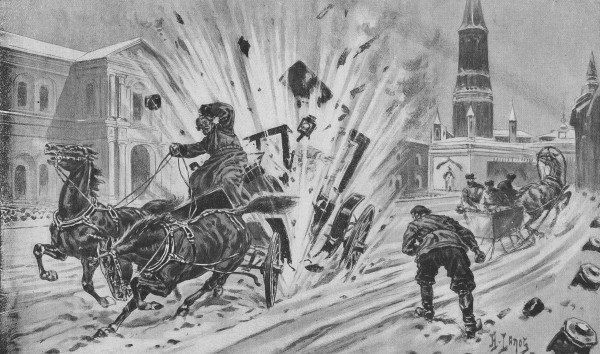
A sketch of the assassination of Grand Duke Sergei, 1905.
To Break Russia’s Chains takes us inside the mindset of Savinkov and his fellow revolutionary terrorists as they stalk their prey, including Minister of the Interior Vyacheslav von Plehve--assassinated by Savinkov’s crew in July 1904--and Grand Duke Sergei, Nicholas II’s uncle, who was killed in February 1905. When two of von Plehve’s assassins were captured, they declared their bomb did not contain dynamite, “but the tears and sufferings of the entire Russian people.”
One of Alexandrov’s strengths is in stitching together a coherent pattern to Savinkov’s beliefs. However strange and paradoxical it may seem to us today, Savinkov believed the best path for Russia lay through employing political violence that would pave the way for a new, more representative government. While in France in 1914, Savinkov’s decision to call for all revolutionary activity to cease and to serve as a wartime correspondent came because he thought the Germans represented the greatest threat to a better Russia.
After the February Revolution, he plunged into the Provisional Government’s cause because, as he wrote to the poet Zinaida Gippius, “I love Russia and that is why I do what I do. I love the revolution and that is why I do what I do.” Savinkov’s attraction to Lavr Kornilov, a Cossack General who attempted a much-debated action in August-September 1917 resulted from a belief that a coup might be necessary to save Russia at that time. He ultimately rejected Kornilov because he feared an ensuing dictatorship.
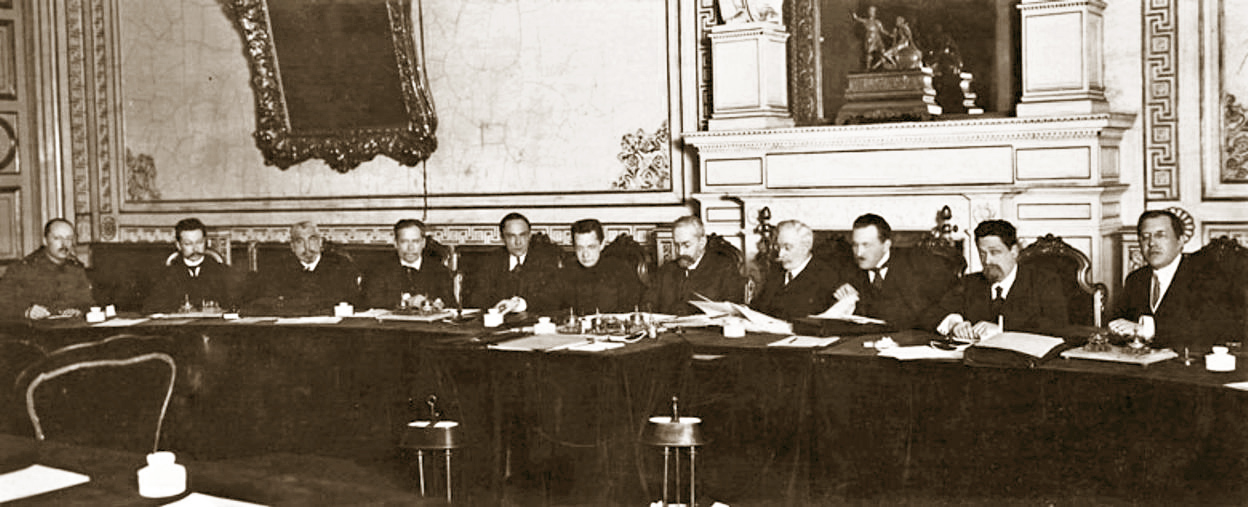
The Russian Provisional Government in March of 1917.
His subsequent opposition to the Bolsheviks stemmed from similar beliefs. He was consistently willing to employ direct political violence, hatching plans to assassinate Lenin and Trotsky and then sought to kill Boris Chicherin, the first Soviet Commissar for Foreign Affairs, in Genoa in 1922. Alexandrov concludes that Savinkov ultimately should be remembered for “his conception of a free Russia and for his remarkable struggle to bring it to life.”
Throughout the biography, Alexandrov highlights—perhaps overemphasizes—the “what ifs” of history. At the outset, he argues “if any of the extraordinary plots he [Savinkov] hatched against the Bolsheviks had succeeded, the world we live in today would be unrecognizable.” When discussing the Kornilov Affair, Alexandrov concludes it represented the “second time in Savinkov’s life that his determined pursuit of a goal resulted in the opposite of what he wanted.” (The first came with Savinkov’s support for the duplicitous double agent Evno Azef).
These could-have-beens and unintended results capture a crucial point: Savinkov’s plans never seemed to succeed. The SR assassinations did not bring revolutionary change, nor did his post-1917 activities yield the results he wanted. Savinkov himself seemed to realize this, particularly in his novel What Never Happened, published serially in 1912 and 1913. A fictionalized account of the 1905 Revolution told through one family, the novel engages with Tolstoyan views of history. One character realizes that the SR Party leadership had no real effect on the larger historical forces enveloping Russia in that revolutionary year.
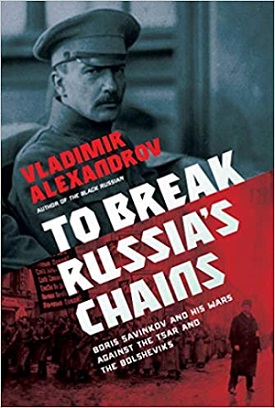
Cover of To Break Russia’s Chains: Boris Savinkov and His Wars Against the Tsar and the Bolsheviks by Vladimir Alexandrov.
As Alexandrov characterizes it, What Never Happened is “a very unhappy book,” one that “expresses Savinkov’s conclusion that he has failed as a revolutionary and that the Russian revolutionary movement as a whole has been defeated.”
Certainly, many of Savinkov’s acquaintances seemed to believe he could lead change. Somerset Maugham called him the most extraordinary man he had ever met. Churchill—who had read Pale Horse—thought he could defeat the Bolsheviks. So too did Tomas Masaryk, the first President of an independent Czechoslovakia. Alexandrov offers the best conclusion for understanding Savinkov’s remarkable life and ultimate fate: “as is often the case, what happened was the exact opposite of what he expected.”
